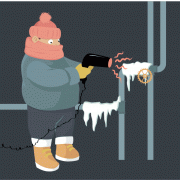Freezing temperatures can be a pain in the pipes!
Here are some ways to make sure your pipes survive freezing cold temperatures:
- Insulate pipes in unheated parts of the home (like crawl spaces).
- Open doors on cabinets below sinks to allow warmer room air to circulate around the plumbing.
- Disconnect water hoses from outdoor spigots.
- Protect your lawn sprinkler systems. Irrigation line breaks and sprinklers spraying onto sidewalks and roadways will quickly lead to serious public safety hazards and expensive repairs.
- Locate the master water shut-off valve in your home now in case you experience a burst pipe and need to cut your water off in a hurry.
Pipes already frozen?

Once temperatures rise and pipes begin to thaw, frozen pipes that burst will begin to gush water and need to be repaired immediately. Take a few minutes to stop, look, and listen.
Stop what you’re doing in your home and listen for the sound of running water. You can usually hear water running through pipes. Check to make sure faucets, washers, dishwashers, and toilets are not running. If those are all off and you still hear water running in the pipes, you may have a broken pipe.
Look at where your pipes are: in crawl spaces, outside spigots, and possibly in your yard. Look for signs of water running when it’s not supposed to. If you see a problem, call a plumber.
If you don’t see any problems, but you hear water running and know all faucets and washers are shut off, then look at the water meter outside. If the dial is spinning, then water is running in (and out) of your system. Call a plumber immediately.
Running water runs up your water and sewer bills, stresses the water system, and could cause a lot of expensive damage to your home.
Protect Your Backflow Equipment Too
We also encourage commercial and residential water customers with irrigation systems to take steps to protect their backflow prevention equipment from cold weather damage that can cause system leaks:
- The best way to prevent freezing on an irrigation backflow connection is to drain the assembly of all water for the winter. Turn off your irrigation system at the shut-off valve and drain the system. Open test cocks and shut-off valves on the assembly to discharge any water. Leave valves open 1/8 of a turn. A fully open or fully closed valve will trap water behind the ball in the valve which will leave the valve susceptible to freezing.
- If your device/connection remains in use for the winter, be sure the backflow cover fits securely to the ground to prevent air infiltration. Check your cover for any cracks, holes, splits, etc.
- Wrap old blankets or beach towels around the assembly for temporary protection during the peak of the cold temperatures.
